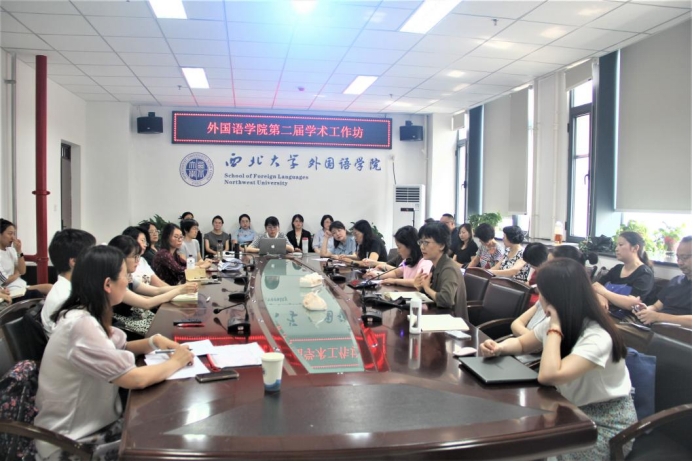To foster a conducive academic atmosphere, facilitate the establishment of research teams and cooperation platforms for teachers with similar research interest, discuss and solve research challenges, share research achievements, and keep abreast of academic trends, the School of Foreign Languages held the second Teachers’ Academic Workshop on the afternoon of July 12, 2023, in the West Building. A total of 39 participants, including Dean Cao Ruonan, Associate Dean for Research Su Rui, and faculty members of the school, attended the workshop.

Conference Venue
The participating teachers gathered in the conference room on the 5th floor of the West Building. Dean Cao Ruonan introduced the purpose and significance of holding the academic workshop, emphasizing that teachers should scientifically position themselves in research, integrate resources, concentrate advantages, and leverage their expertise. She encouraged teachers to closely align with the overall trends in research, overcome psychological barriers, build confidence in research, make full use of the platform provided by the college, and actively participate in research activities, aiming to form a virtuous cycle and make breakthroughs.
The workshop consisted of four parallel forums: Area Studies Forum, Translation Studies Forum, Literature Studies Forum, and Linguistics Studies Forum. Each forum was chaired by Dean Cao Ruonan, Vice Dean Su Rui, Associate Professor Zhang Min, and Associate Professor Zhang Liyin respectively. The participating teachers engaged in lively discussions and sharing sessions on various topics.
The discussion topics of the Area Studies Forum included:
(1) Our school has established the framework, implementation path, and team grouping for area studies. Based on the overall research planning of the university and the development of the school’s disciplinary construction, our school has initially defined two major regions for area studies: South Asia and North Africa. Professor Li Tie is responsible for the South Asia direction, while Professor Cao Ruonan is responsible for the North Africa direction.
(2) Based on the approach of regional division, country selection, and problem focus, we assist teachers interested in engaging in area studies to identify landing points, assess individual research potential reasonably, explore topic ideas from shallow to deep, and explore reasonable and feasible research methods.
(3) Starting from next semester, the research teams in our school’s regional country field will regularly conduct seminars, tackle key issues, and exchange reports in a team format. At the same time, workshops for paper writing and project proposal writing will be arranged to create all possible research environments and channels for teachers.
The translation forum discussed the following three topics:
(1) Application for the National Social Science Fund’s “Translation of Chinese Academic Works” project. Participating teachers shared and exchanged important aspects of the application process for the “Translation of Chinese Academic Works” project funded by the National Social Science Fund. This included sharing insights on key aspects such as the team’s introduction in both Chinese and English, selection of original works, communication skills with domestic and foreign publishers, obtaining author and publisher authorization, considerations for filling out project application forms, polishing, formatting, and printing of translation samples, among others.
(2) Shifts in cognitive orientation in translation studies. Participating teachers explored and briefly reviewed several important stages of development in translation studies and their typical characteristics. They discussed the gradual emergence of technical methods and means in the translation process, as well as the era context and inevitable trends of cognitive shifts in translation research.
(3) Design, data collection, and analysis of cognitive translation research experiments. Participating teachers shared and discussed the cognitive mechanisms of translation in the brain, unveiling several experimental research methods and tools for decrypting the “black box” of the brain, as well as the design, data collection, and analysis of research experiments.
The literary forum discussed three main topics:
(1) Proposal of literary research topics, publication of papers, and book publication. Participating teachers engaged in discussions and sharing on various aspects, such as the characteristics of proposal submission for different levels of research topics, considerations for publishing papers in domestic and international journals, the process of publishing monographs, and methods for applying for post-project funding.
(2) Key issues in contemporary literary research. Participating teachers shared discussions on key issues in contemporary literary research, focusing on three aspects: the background, current situation, and prospects of the ethical turn in literary research; a comparison between Western leftist theory and the authentic ethics of Chinese traditional culture; and polyphony theory and novel research, as well as ethnic literature and diaspora literature research.
(3) Literary research in the context of cross-civilizational backgrounds, focusing on English literature research in the context of civilizational exchanges and comparative literature research in the context of “the dissemination of Chinese culture”. Participating teachers discussed literary research issues from the perspective of regional identities, with a particular focus on literary works and theories from countries and regions such as Syria and South Asia, aiming to explore new ideas and directions in literary research.
The linguistic forum revolved around the following three main topics:
(1) Research and proposal of ideological and political themes in English curriculum. Participating teachers discussed how to implement ideological and political education in the curriculum by integrating it into teaching materials, classroom teaching, and students’ mindset. They explored how each course can fulfill its educational responsibilities and how ideological and political education can be integrated into teaching and talent cultivation. Additionally, they discussed how to conduct research and proposal on values-oriented topics.
(2) Teaching and research on specialized English. Using doctoral dissertation writing as an example, participating teachers discussed topics such as research topic selection, theoretical frameworks, research methods, data collection, and publication of results.
(3) Integration of teaching and research. Participating teachers proposed the application of the POA theory in cultural courses and the use of technologies such as eye-tracking devices and OpenAI in teaching.
Conducting academic workshops is of great significance for our school to consolidate research strength, improve research level, and promote sustainable development in research.
Text: Li Zhaoyan
Photo: Li Jia